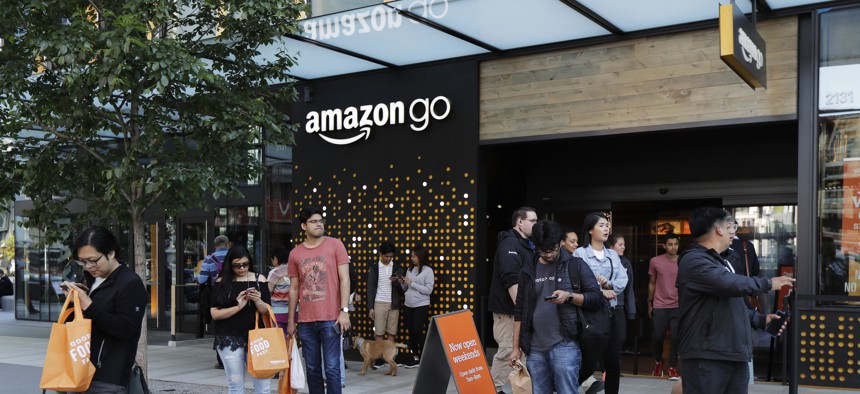Connecting state and local government leaders
Several cities are considering bans on cashless stores and restaurants.
Of the most popular coffee shops in San Francisco’s Financial District, only one is manned by a robot. Every morning, in a glass-and-wood booth on the corner of One Bush Street, customers queue around a whirring hydraulic arm, waiting for it to serve them cappuccino. It’s an odd sight. Cafe X has three San Francisco locations, and all are cashless and fully automated, with orders taken via app.
The one I pass on the way to work each morning is mere steps away from Amazon’s cashless Go store, where human cashiers and baggers have disappeared, and juice and milk are dispensed by wanding your phone over a sensor. Human attendants hover in the lobby to aid shoppers, mostly newcomers confused by the entire cashless scheme. And Amazon does have human employees who prep food and stock items.
Replacing checkout lanes with sensors and cash registers with swiveling iPads (frictionless shopping is the term of art here) makes for a novel shopping experience, one that Amazon hopes will help it gather shopper data to increase profits. Shoppers pay via the bank account attached to their Amazon profile, and each purchase is recorded and analyzed for insights into their behaviors and preferences. A sophisticated camera system—using the same technology that steers self-driving cars—monitors shoppers’ movements within the store. Even what they don’t do is recorded: For example, customers who pick up a carton of milk and then set it aside for a less expensive brand could have coupons sent to them.
Arguments against uploading the grocery store to the cloud include potential job losses for cashiers and baggers, but also cybersecurity and IT failures, particularly during disasters. Imagine dozens of shoppers running for sensors in the panicked hours ahead of tornadoes or winter storms. (Amazon has said its Go stores can handle an influx of shoppers, up to fire code.)
A December report from the United Kingdom also raised the issue of surveillance and abuse. Couples with shared bank accounts can easily track each other’s purchases in a cashless economy, which could make it easier for abusers to harass their spouse.
Still, cashless is catching on. A second Amazon Go location in the Financial District, a few blocks west, opened this week. Walmart and Tesco are exploring similar cashless stores. The popular fast-casual restaurant Sweetgreen, the men’s retailer Bonobos, and the Drybar hair salon have all sworn off paper bills, advising employees to simply turn people away if they can’t pay digitally. Visa just awarded 50 small businesses, almost all of them fast-casual food spots, $10,000 each for winning its “cashless challenge.”
“We’re going cashless to keep up with the Millennial trend,” one chirpy winner says in Visa’s promotional YouTube clip. The winners value a post-cash setup because it makes for faster transactions and fewer trips to the bank, they say. “No one likes cash,” one owner concludes. “And we don’t like cash.”
Killing cash makes billions for credit-card companies. “Card swipe” fees, a roughly 1 percent charge that retailers pay to banks when shoppers pay using credit and debit cards, earned Visa and Mastercard about $43 billion last year, according to The Wall Street Journal. Shifting businesses toward “frictionless” card-only pay models is an enormous moneymaker, especially in high-volume food spots where people want to get in and get out as rapidly as possible.
It’s a quick and convenient design, and customers may not know that billions of dollars in invisible micro-charges are motivating the shift to “tap to pay” stores popping up in their neighborhood. But while the distinction between cash and money may be irrelevant to a new crop of Millennial-focused restaurant owners, some lawmakers are arguing that cashless design is classist. In November, the New York City councilman Ritchie Torres introduced a bill to ban all types of cashless retailers, Go stores, and restaurants. Similar bills have been introduced in Philadelphia and D.C. Chicago’s attempt at a ban failed.
“In some ways, making a card a requirement for consumption is analogous to making identification a requirement for voting,” Torres told Grubstreet last month. “The effect is the same: It disempowers communities of color.”
Seventeen percent of all black households and 14 percent of all Hispanic households had no bank account in 2017, according to a report from the FDIC. Some have poor credit; some work jobs where they’re paid only in cash. Cashlessness isn’t an option for them. Similar to how Go shoppers can’t get beyond the lobby without an app and an Amazon account, cashless stores, Torres says, create public spaces that all but bar low-income people from entry. The unbanked have two choices: Join a digital economy via the traditional banking institutions or disappear from these new spaces.
It will be interesting to see the how a cashless society helps or hinders people with even fewer resources. Consider the U.K.’s Greater Change pilot in August, supported by Oxford University’s Said Business School. The purpose of the pilot was to allow for cashless donations to the homeless. The charity offered lanyards to homeless people, each with an attached barcode. Simply scanning your phone over the person’s QR code sent a small amount of money to them.
Programs like these may result in a bump in donors, but there could also be stigma associated with redeeming the lanyards. If history is any indication, the effects of these technological changes on society’s most vulnerable people won’t be considered until they’ve become a reality.
Sidney Fussell is a staff writer at The Atlantic, which originally published this article.

NEXT STORY: Trump Administration Moves On Tougher Food Stamp Work Requirements



